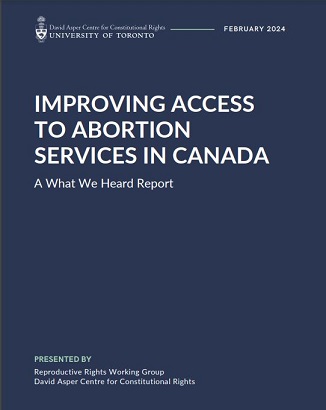On March 14, 2024 the Asper Centre hosted a panel event to celebrate the launch of “Improving Access to Abortion Services in Canada: A What We Heard Report.”
The Asper Centre regularly convenes student working groups that prepare policy briefs, draft public legal information materials, organize workshops and conduct research on current or emerging constitutional law issues. The Asper Centre’s Reproductive Rights Working Group was convened in September 2022, as a reaction to the Dobbs v Jackson Women’s Health Organization decision in which the United States Supreme Court overturned the holding of Roe v Wade that previously maintained abortion access as a constitutional right.
The Working Group sought to investigate and respond to the growing concern of how Dobbs may implicate reproductive rights in Canada and whether the Canadian regime is similarly vulnerable. Accordingly, the Working Group organized an Expert Panel of leading minds in the field (see the Appendix in the report for the list of experts), the purpose of which was to investigate these pressing issues and to yield recommendations for policy makers.
In late February 2024, the Reproductive Rights Working Group published their “What We Heard” report containing the critical findings and detailed recommendations by the Expert Panel. Collectively, we hope that this report will bring an expert lens to and clarify the current key issues in the Canadian reproductive rights landscape and that it will be used as an advocacy tool to improve access to abortion services in Canada.
the Reproductive Rights Working Group published their “What We Heard” report containing the critical findings and detailed recommendations by the Expert Panel. Collectively, we hope that this report will bring an expert lens to and clarify the current key issues in the Canadian reproductive rights landscape and that it will be used as an advocacy tool to improve access to abortion services in Canada.
The launch event on March 14th began with an introduction from 2 of the report authors and the leaders of the working group, JD students Ian T. D. Thomson and Lauren Di Felice. Comments were then provided by:
- Prof Rebecca Cook (Professor Emerita, U of T Law and Co-Director, International Reproductive and Sexual Health Law Program at the University of Toronto)
- Prof Brenda Cossman (U of T Law)
- Kat Owens (Reproductive Justice Project Director, LEAF)
- Prof Charmaine Williams (Dean & Professor, Factor-Inwentash Faculty of Social Work, University of Toronto)
View a recording of the event HERE and click on image below to read the report.
(Photo above: From L to R Prof Brenda Cossman, Prof Charmaine Williams, Kat Owens, Cheryl Milne, Lauren di Felice and Ian T.D. Thomson)

